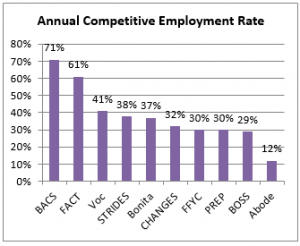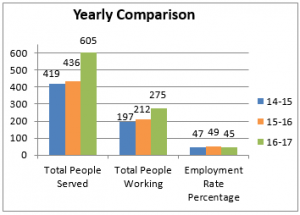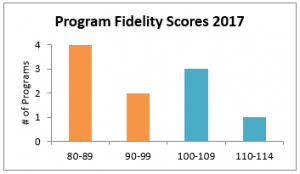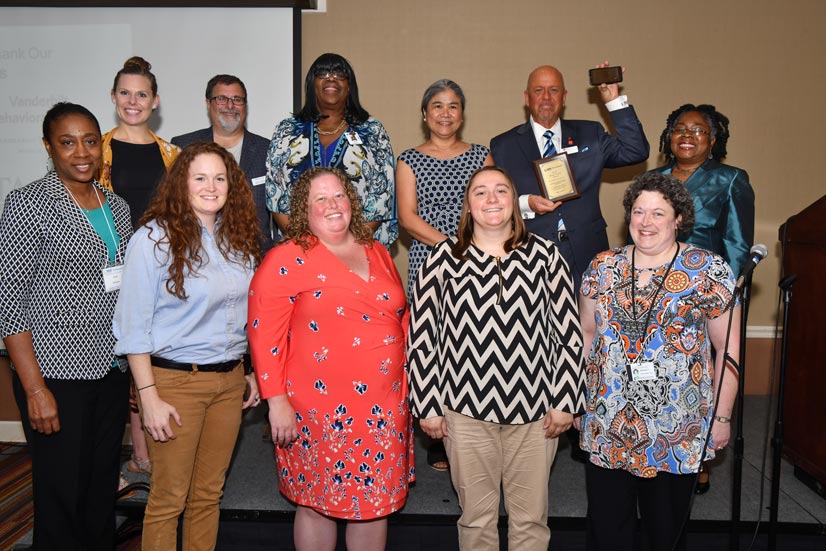**By Jackie Pogue, IPS trainer, Alameda County Behavioral Health Care Services
Alameda County Behavioral Health Care Services (BHCS) completed our fifth year of Individual Placement and Support (IPS) implementation in 2016-2017, with exciting results. We expanded our IPS program roster to 10 programs serving over 600 people. These programs include: Abode Services Greater HOPE, Bay Area Community Services, BHCS Vocational Program, Bonita House HOST and Casa Ubuntu, Building Opportunities for Self Sufficiency, East Bay Community Recovery Project FACT, Fred Finch Youth Center, PREP Alameda, Telecare CHANGES, and Telecare STRIDES. In addition, we continued to provide ongoing training, technical assistance, and fidelity reviewing to our partnering agencies. We also supported the further development of IPS services within BHCS and throughout the state.
Expansion
In July 2016, we officially launched IPS in six Full Service Partnership (FSP) programs that serve a variety of people, including young adults with early psychosis, homeless adults, people with co-occurring substance use disorders, and people involved in the criminal justice system. The new partner programs – PREP Alameda, Bonita House HOST, Abode Services Greater HOPE, Telecare STRIDES, Telecare CHANGES, and East Bay Community Recovery Project FACT – all received technical assistance to realign their vocational services to IPS and made great strides in their first year toward reaching good fidelity. Additionally, BHCS expanded IPS training resources last year by hiring another IPS Trainer, for a total of two Trainers providing technical assistance and evaluation to our programs.
Quality Improvement
Each program received one or two fidelity reviews during the year, led by the IPS Trainers and qualified volunteer reviewers. Reviews are usually two days long and include stakeholder interviews, meeting and job development observations, and reviewing chart documentation. Programs receive a detailed report with scores for each IPS fidelity item, observations and feedback, and recommendations for improvement. Higher fidelity is correlated to increased employment outcomes.
We completed 13 fidelity reviews and programs achieved fair and good fidelity, with scores ranging from 80- 113. For our four established programs, their fidelity scores ranged from 94-113, with an average of 102. For the six new programs, their scores ranged from 80- 101, with an average of 89. It’s expected that programs in early implementation of IPS will have lower fidelity scores that improve over time.
“The employment specialists have a level of dedication that’s nice to see.”
Training
IPS Trainers provided an array of training for employment specialists and IPS supervisors through monthly formal training events. Topics included assisting young adults with IPS, supported education, promoting career development, job development, public benefits and working, Medi-Cal documentation, collaboration with the Department of Rehabilitation, and IPS supervisory skills. In addition, we provided training at various programs to help practitioners and leaders understand the IPS model.
IPS Trainers also provided ongoing, one-on-one technical assistance to programs to help solve problems and improve implementation. For example, trainers advise on agency IPS steering committees, provide field coaching for job development with supervisors and employment specialists, and consult during IPS and mental health team meetings on IPS client issues.
“I got a job right away with IPS. I was surprised because I hadn’t worked in 16 years.”
Outcomes
 The six new FSP programs combined with our four established IPS programs at Bay Area Community Services, Fred Finch Youth Center, Building Opportunities for Self-Sufficiency, and the BHCS Vocational Program served 605 people from July 2016- June 2017, 275 (45%) of whom worked at least one regular job in the community. 25% of jobs worked were full time positions and the majority of jobs obtained were in the service industry, including retail, food service, janitorial, grocery, and security. People also worked in warehouse, child care, administrative, education, elder care, and transportation sectors.
The six new FSP programs combined with our four established IPS programs at Bay Area Community Services, Fred Finch Youth Center, Building Opportunities for Self-Sufficiency, and the BHCS Vocational Program served 605 people from July 2016- June 2017, 275 (45%) of whom worked at least one regular job in the community. 25% of jobs worked were full time positions and the majority of jobs obtained were in the service industry, including retail, food service, janitorial, grocery, and security. People also worked in warehouse, child care, administrative, education, elder care, and transportation sectors.
The employment rates and job start activity in IPS programs varies, which can be attributed to the respective level of IPS implementation. We also expect that newer programs initially have lower outcomes that increase as the IPS service strengthens and matures.
“The new service [IPS] is better for me because now I challenge myself. I want more money and a better life.”
Public Benefits and Working Initiative
With the minimum wage increasing in the Bay Area, IPS clients are earning more money from work. This increased income creates challenges for maintaining Medi-Cal health insurance and Social Security benefits. To this end, we convened a workgroup to increase shared understanding of this problem and find solutions. Clinic and vocational directors, health insurance technician supervisors, benefits counselors, IPS trainers, and the Sub-Payee manager worked together to strengthen expertise of linking people to Social Security Medi-Cal programs for workers, delaying subsidized housing rent calculations for new workers, and increasing access to individualized benefits counseling.
The benefits work group developed an educational presentation on the topic, which all of the mental health teams with IPS have received over the past year. In addition, health insurance technicians were trained to ask people about their work status and to link them to the appropriate insurance program for workers with disabilities. Lastly, through group presentations and individual counseling, The Center for Independent Living benefits counselors educated IPS clients and staff about how working impacts benefits.
Looking Ahead
In 2017-18, we look forward to strengthening our existing IPS programs and continuing our efforts to expand access to IPS in our county and throughout California. To that end, we plan to:
- Sustain and grow current IPS programs and help them achieve good fidelity to the IPS model through regular fidelity reviews and effective training and consultation.
- Drive the development of IPS services in CalWorks, Transition Age Youth, Criminal Justice, Substance Use Disorder, the Whole Person Care initiative, and other specialty mental health programs.
- Host two regional meetings for IPS stakeholders and an IPS Leadership Conference to support the growth of IPS throughout the state.
- Strengthen our employer partnerships through the development of a recognition program and employer events.
Thank you Jackie for contributing this story. We love to hear from IPS programs from around the country and the world. If you would like to submit an entry for our blog, please contact us!









Leave A Comment
You must be logged in to post a comment.